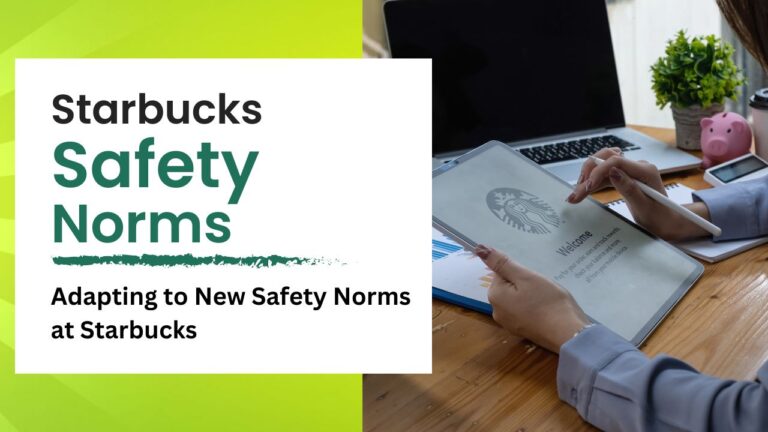Nurturing Mental Well-being in a Fast-Paced Environment

In today’s fast-paced work environments, particularly in high-pressure settings like Starbucks, nurturing mental well-being is not just important, it’s essential. Employees, from baristas to managers, face a myriad of challenges that can impact their mental health. Understanding and addressing these challenges is key to maintaining a healthy, productive workforce. The importance of mental well-being in such environments cannot be overstated. It’s crucial for maintaining not only the individual health of employees but also for fostering a positive and productive workplace culture.
Understanding the Challenges
Recognizing Stress Factors in Fast-Paced Work Environments
In a dynamic environment like Starbucks, employees often have to manage ‘Starbucks partner hours’ amidst a backdrop of continuous customer interaction and high expectations. The fast-paced nature of the job, coupled with the need to maintain customer satisfaction, can contribute significantly to workplace stress. Recognizing these factors – from managing a bustling store environment to dealing with complex customer orders – is the first step in mitigating their impact on employees’ mental well-being.
The Impact of Constant Pressure on Mental Health
The continuous pressure in such a work environment, if not managed well, can have a profound impact on mental health. Employees who constantly work long My partner hours might experience chronic stress, leading to issues like anxiety, burnout, and a decrease in overall job satisfaction. Management must understand these implications and implement strategies to mitigate these risks, ensuring a healthier work environment for all.
Identifying Signs of Mental Fatigue
Physical and Emotional Indicators of Stress
The ability to identify signs of mental fatigue is vital. Physical symptoms like headaches, fatigue, or sleep disturbances, and emotional signs such as irritability, lack of motivation, or feelings of hopelessness, are key indicators of stress. Being able to recognize these signs early in oneself or others is crucial for addressing mental well-being proactively.
The Importance of Early Recognition
Early recognition and intervention are essential in managing mental health in the workplace. Simple steps such as monitoring Starbucks gift card balance can be an indicator for management to encourage staff to take breaks and enjoy a moment of relaxation. Similarly, employees should be encouraged to regularly check Starbucks card balance and take advantage of the benefits offered for personal well-being, such as taking a day off for mental health.
Establishing a Routine for Mental Wellness
The Role of Consistent Schedules in Reducing Stress
A consistent schedule is a powerful tool in the quest for mental well-being. Regular routines can reduce stress by providing predictability in our lives, which in turn reduces anxiety. When our brain knows what to expect, it operates more efficiently, leading to a calmer and more focused mindset. Consistency in our daily lives helps us manage our time and responsibilities, making tasks seem less daunting.
Tips for Creating a Balanced Daily Routine
Creating a balanced routine involves prioritizing both work and personal time. Start by defining your non-negotiables – these could be work hours, family time, or self-care activities. Ensure that each day has a mix of productivity and relaxation. It’s crucial to set realistic goals and include breaks to avoid burnout. Remember, a balanced routine should enhance your life, not add to its complexities.
The Power of Mindful Breaks
Integrating Short, Mindful Breaks into the Workday
Mindful breaks, even if they are just a few minutes long, can be incredibly rejuvenating. These short pauses are opportunities to disconnect from work and reconnect with your inner self. During these breaks, practice mindfulness or simply enjoy a moment of stillness. This practice helps in reducing stress and improving focus, making you more productive when you return to your tasks.
Techniques for Effective Relaxation
Effective relaxation techniques include mindfulness meditation, deep breathing exercises, or even a short walk. The key is to find an activity that allows your mind to pause and reset. You might try listening to calming music, practicing a few yoga stretches, or enjoying a cup of tea. These techniques can lower stress levels and improve overall mental clarity.
Prioritizing Sleep and Rest
The Critical Role of Sleep in Mental Health
Sleep is fundamental to our mental health. It’s during sleep that our body repairs itself and our brain processes the day’s experiences. Lack of quality sleep can lead to a range of mental health issues, including increased stress, anxiety, and depression. Ensuring adequate and quality sleep is essential for maintaining a healthy mind and a balanced emotional state.
Strategies for Improving Sleep Quality
To improve sleep quality, establish a consistent sleep schedule and create a restful environment in your bedroom. Avoid caffeine and screens before bedtime, as they can disrupt your sleep cycle. Consider relaxation techniques like reading or light stretching before bed. Remember, the quality of your sleep is just as important as its quantity.
Healthy Lifestyle Choices
Nutritional Choices That Support Mental Well-Being
Nutrition plays a significant role in mental health. Foods rich in omega-3 fatty acids, such as fish, nuts, and seeds, have been shown to improve mood and cognitive function. Including a variety of fruits, vegetables, and whole grains in your diet can also have a positive impact on your mental well-being. It’s important to pay attention to your body’s response to different foods and adjust your diet accordingly.
The Benefits of Regular Physical Exercise
Regular physical exercise is not only good for the body but also for the mind. Exercise releases endorphins, which are natural mood lifters. Activities like jogging, swimming, or even a brisk walk can significantly reduce stress and anxiety. Consistent exercise also improves sleep quality and boosts self-esteem, contributing to overall mental wellness.
Building a Support Network
Social connections are crucial for mental well-being. They provide a sense of belonging and support, which is essential in times of stress. Strong social ties can increase our resilience to mental health challenges. It’s important to nurture relationships with family, friends, and colleagues, as these connections provide comfort and perspective during difficult times.
Creating and Maintaining Supportive Relationships
Building and maintaining supportive relationships requires effort and commitment. It involves active listening, empathy, and mutual respect. Make time for social interactions, whether it’s a quick coffee with a friend or a family gathering. Be open to new relationships but also invest in existing ones. Remember, quality matters more than quantity when it comes to relationships.
Leveraging Technology for Well-Being
Technology offers a wealth of resources for managing stress and practicing mindfulness. There are numerous apps available for meditation, sleep improvement, and habit tracking. These tools can provide guided exercises, reminders, and insights to help you stay on track with your mental wellness goals. Choose apps that resonate with your lifestyle and use them as a complement to your daily wellness routine. However, it’s important to use technology mindfully and not let it become a source of additional stress.
Balancing Digital Life with Mental Health
Balancing your digital life is crucial for mental health. Excessive screen time can lead to increased stress and disrupt sleep patterns. Set boundaries for your digital consumption, such as designated tech-free times or areas in your home. Engage in digital detoxes periodically to give your mind a break from constant stimulation. This balance is key to ensuring that technology remains a tool for wellness, not a hindrance.
Read Related Posts:
Workplace Strategies for Mental Health
Creating a Mentally Healthy Work Environment
A mentally healthy work environment is crucial for overall well-being. Employers can create such environments by promoting work-life balance, providing resources for stress management, and encouraging regular breaks. A supportive work culture acknowledges the importance of mental health and provides a safe space for employees to express their needs and concerns.
Policies and Practices That Support Employee Well-Being
Implementing policies that support mental health can significantly improve the workplace environment. This might include flexible working hours, mental health days, and access to counseling services. Regular training and workshops on stress management and mental wellness can also be beneficial. Such practices not only improve employee well-being but also enhance productivity and job satisfaction.
Encouraging Open Dialogue
Fostering a Culture of Open Communication
Open communication about mental health in the workplace is vital. Creating an environment where employees feel comfortable sharing their struggles without fear of judgment or repercussions is key. This can be achieved through regular check-ins, feedback mechanisms, and an overall culture of empathy and understanding.
Resources for Mental Health Support in the Workplace
Providing resources for mental health support in the workplace is essential. This could include access to mental health professionals, online resources, or employee assistance programs. Additionally, educating employees about these resources and how to access them is equally important, ensuring that everyone knows help is available when needed.
Professional Development and Mental Health
Balancing Career Growth with Personal Well-Being
Balancing career growth with personal well-being is a delicate act. It’s important to pursue professional ambitions without compromising mental health. Setting realistic career goals, seeking feedback, and maintaining a healthy work-life balance are key strategies. Remember, success in the workplace should not come at the cost of your mental well-being.
Strategies for Dealing with Work-Related Stress
Dealing with work-related stress effectively requires a proactive approach. This includes time management, setting clear boundaries, and knowing when to ask for help. Developing coping mechanisms such as mindfulness, exercise, or hobbies can also be beneficial. Regularly assess your stress levels and adjust your work habits as needed to maintain a healthy balance.
Personal Growth and Mental Resilience
Personal growth and mental resilience are key to thriving in today’s fast-paced world. By developing skills for resilience and adaptability, and embracing challenges as opportunities for growth, we can better manage stress and maintain mental well-being.
Developing Skills for Resilience and Adaptability
Resilience and adaptability are skills that can be developed with practice. Start by embracing a growth mindset, viewing challenges as opportunities to learn and grow rather than obstacles. Cultivate optimism, focusing on solutions rather than problems. Practicing flexibility in thoughts and actions also builds resilience, helping you adapt to changing circumstances with ease.
Embracing Challenges as Opportunities for Growth
Viewing challenges as opportunities for personal growth is a powerful mindset shift. It encourages us to step out of our comfort zones and learn new skills. Every challenge faced and overcome builds confidence and resilience, making us better equipped to handle future stressors. Remember, growth often happens outside our comfort zones.
Mindfulness and Self-Awareness Practices
In our fast-moving world, maintaining mental well-being is increasingly challenging. One effective approach is through mindfulness and self-awareness practices. These techniques not only help in managing stress but also enhance overall life satisfaction. Here, we’ll delve into how incorporating mindfulness into daily life and understanding the role of self-awareness can be transformative.
Incorporating Mindfulness into Daily Life
Mindfulness is the practice of being fully present and engaged in the moment, aware of your thoughts and feelings without distraction or judgment. Integrating mindfulness into your daily routine can have profound effects on your mental well-being.
- Start with Small Steps: Begin by dedicating a few minutes each day to mindfulness practices such as deep breathing or mindful walking.
- Mindful Eating: Pay attention to the taste, texture, and aroma of your food. This not only enhances the eating experience but also promotes better digestion.
- Mindful Listening: Practice active listening in your conversations, focusing completely on the speaker without formulating responses in your mind.
- Pause Between Tasks: Take brief pauses between daily tasks to center yourself and bring your focus back to the present moment.
The Role of Self-Awareness in Managing Stress
Self-awareness is the conscious knowledge of one’s own character, feelings, motives, and desires. It plays a critical role in stress management by helping us understand our response to stressors.
- Recognizing Stress Triggers: Understanding what triggers your stress is the first step in managing it effectively.
- Emotional Intelligence: Self-awareness enhances emotional intelligence, aiding in better control over your reactions and emotions.
- Reflective Practices: Engaging in reflective practices like journaling can help in identifying patterns in thoughts and behaviors that contribute to stress.
- Seeking Feedback: Sometimes, gaining insights from others can provide a new perspective on how we handle stress and react to situations.
Setting Realistic Goals and Boundaries
Setting realistic goals and boundaries is essential for maintaining a healthy mental state. It involves understanding your limits and ensuring that your aspirations are achievable and aligned with your personal well-being.
Importance of Setting Achievable Goals
Setting achievable goals is crucial for several reasons:
- Reduces Overwhelm: Realistic goals prevent feelings of being overwhelmed and reduce the risk of burnout.
- Increases Motivation: Achievable goals keep motivation levels high, as regular accomplishments provide a sense of progress and satisfaction.
- Enhances Focus: Clear, attainable goals provide direction and focus, preventing wasted energy on unattainable targets.
- Promotes Self-Confidence: Successfully achieving goals, even small ones, boosts self-confidence and encourages further personal growth.
Learning to Set Healthy Boundaries
Setting healthy boundaries is vital for mental well-being and sustaining positive relationships.
- Understand Your Limits: Know your emotional, mental, and physical limits. Understanding these helps in identifying what you can tolerate and accept.
- Communicate Clearly: Articulate your boundaries to others clearly and respectfully to avoid misunderstandings.
- Practice Saying No: It’s okay to decline requests that conflict with your values, goals, or capacity.
- Self-Care: Prioritize self-care and don’t feel guilty for doing so. Remember, you can’t pour from an empty cup.
Conclusion
In conclusion, nurturing mental well-being in a fast-paced environment requires a mindful approach and a conscious effort to maintain balance. By integrating mindfulness and self-awareness into daily life, setting achievable goals, and establishing healthy boundaries, individuals can effectively manage stress and enhance their overall mental health. These practices empower people to navigate the complexities of modern life with resilience, ensuring a fulfilling and mentally healthy lifestyle.






